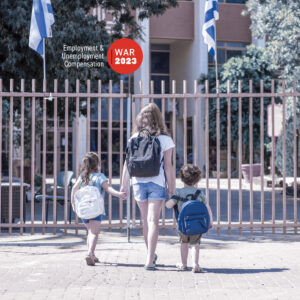The best investment for Israel at this point is a “New Deal” of investment in education and in its human capital. This is an investment which will yield benefits for years to come
In this most challenging time, there are also some good news to be found. The universities and some of the colleges report a significant increase of 30% in enrollment. After years of stagnation in admissions and a drop in the number of students in the universities, this increase is a good sign. At the same time, it constitutes a singular opportunity to upgrade Israel’s human capital – as was done in many European countries and in line with the recommendations of all of international financial institutions, including the Bank of Israel.
Over the last years, doubts about the merits of academic education were frequently raised, claiming that an academic degree is no longer relevant to the job market. The common perception connecting education with success, lost its holding and the Y Generation stayed away from the colleges and universities.
Consequently, a variety of career tracks bypassing higher education evolved in the labor market. Yet the data was clear: even before the pandemic unemployment rates among persons with academic degrees was significantly lower, and their wages were higher.
The economic crisis created by the corona, exposed the employment market’s duality and the value of high education. Namely, the vast majority of persons with academic education kept their jobs while persons with high-school education (or less) and low wages, especially in the services industry, were let go in high numbers.
Now young adults are changing the picture. Instead of taking on temporary, low-paid positions that offer no job security or quality career path, they turn to education. Enrolment rates for highly demanded professions, accounting, neuroscience, and engineering peaked. The “corona economy” succeeded where the state that tried for many years to encourage study of these subjects, failed.
The increase in enrolment to social arts faculties such as philosophy and history – fields were almost obliterated by the practical perception of high education – is especially encouraging. This due to the inherent value of education, the development of basic skills of reading, writing and analysis, digital literacy, active citizenship, and the ability to integrate in the job market. Moreover, education has a cross-generational impact: the degree of the parents’ education has a direct link to their children’s chances to succeed in school and in their future careers.
The budget allocated to face the corona crisis includes funding of vocational training programs that the government is struggling to implement after years of neglect of the field. Indeed, one would hope that the crisis will bring about improvements in this field as well. Nevertheless, it is no less important to allocate funds to increase accessibility to higher education by funding academic institutions so that they can cater to larger number of students, formation of a support mechanism of scholarship and subsidies so that all of the students admitted – including those of low socioeconomic backgrounds – will complete their degrees. There is also a need to finance matriculation courses and create affordable alternatives to the psychometric exam prep industry so that marginalized populations will have a better chance of being admitted. Similarly, vocational training programs must also receive funding to address the needs of those who are unable or uninterested in pursuing an academic degree.
The Arrangements Law and Corona Budget allocated tremendous amounts to the transportation system´s infrastructure. Yet, the best investment for Israel at this point is a “New Deal” of investment in education and in its human capital. This is an investment which will yield benefits for years to come, and to future generations.
// The article was published originally in The Marker (in Hebrew)






